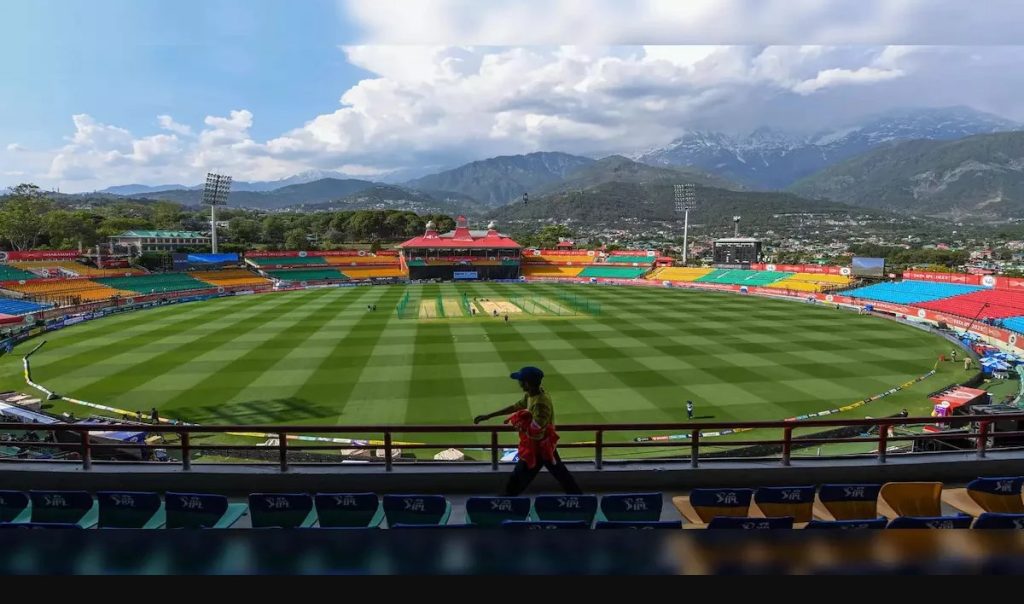Dharamshala: Cricket grounds come in various shapes and sizes, and boundary dimensions play a crucial role in influencing how a match unfolds. Among India’s most scenic and strategically interesting venues is the Dharamshala Cricket Stadium, officially known as the Himachal Pradesh Cricket Association (HPCA) Stadium. While fans marvel at its Himalayan backdrop, players and analysts closely examine its boundary sizes, which impact batting tactics, bowling plans, and overall match strategy.
Table of Contents
In this article, we dive deep into the boundary length of Dharamshala Stadium, comparing it to other major venues and exploring its influence on the game.
Stadium Overview
The HPCA Stadium is located in Dharamshala, Himachal Pradesh, and sits at an altitude of over 1,450 meters (4,757 feet) above sea level. It’s one of the highest international cricket stadiums in the world and is well-regarded for its fast outfield, thin air, and fair pitch.
| Feature | Description |
|---|---|
| Stadium Name | HPCA Stadium, Dharamshala |
| Location | Himachal Pradesh, India |
| Altitude | ~1,457 meters (4,780 ft) |
| Year Opened | 2003 |
| Seating Capacity | ~23,000 |
| Home Teams | Himachal Pradesh, Punjab Kings (IPL) |
Typical Boundary Lengths at Dharamshala
While boundary dimensions can slightly vary depending on match setup, pitch placement, and ICC regulations, the following are the average boundary lengths used in international and IPL games at Dharamshala:
| Boundary Area | Approximate Distance (Meters) |
|---|---|
| Straight (Long-On/Long-Off) | 70–75 m |
| Square of the Wicket | 63–65 m |
| Fine Leg/Third Man | 60–62 m |
| Deep Mid-Wicket/Cover | 65–68 m |
ICC Guidelines for Boundaries
The International Cricket Council (ICC) has specific boundary guidelines for official matches:
- Minimum Boundary Length: 59.43 meters (65 yards) from the center of the pitch.
- Maximum Boundary Length: 82.29 meters (90 yards).
Dharamshala’s average boundary lengths generally comply with these rules, although pitch placement and event type (e.g., domestic or T20) can lead to minor adjustments.
Impact of Boundary Size on Match Play
1. Batting Dynamics
With square boundaries being relatively shorter, batters often target this area for boundaries, especially against spin bowling. Right-handed batters prefer hitting over deep mid-wicket, while left-handers find success over extra cover.
2. Bowling Strategy
Fast bowlers prefer bowling straight or short of a length to encourage cross-batted shots toward the longer parts of the ground. Spinners, on the other hand, must vary their flight and pace to avoid getting punished on the shorter sides.
3. Field Placements
Altitude Factor: How Thin Air Boosts Boundaries
One of the most unique characteristics of Dharamshala is its high-altitude location. The thin mountain air contains less oxygen, which means:
- Less air resistance on the ball
- Balls travel farther with the same power
- Even mishits can clear the fence, especially when lofted straight
This amplifies boundary-hitting potential, especially in T20 matches and powerplays.
Dharamshala vs Other Stadiums (Boundary Comparison)
| Stadium | Shortest Boundary (m) | Longest Boundary (m) |
|---|---|---|
| Dharamshala (HPCA) | ~60 | ~75 |
| Wankhede (Mumbai) | ~58 | ~70 |
| Eden Gardens (Kolkata) | ~62 | ~76 |
| MCG (Australia) | ~65 | ~85 |
| Dubai Intl. (UAE) | ~63 | ~80 |
Compared to larger grounds like the MCG or Dubai, Dharamshala is more favorable for aggressive batting, especially in limited-overs formats.
Performance Trends at Dharamshala
Let’s look at how boundary size has historically influenced scoring:
| Match Type | Average 1st Innings Score | High Score Influencers |
|---|---|---|
| IPL (T20) | 170–180 | Short square, fast outfield |
| ODI | 260–280 | Balanced pitch + boundary mix |
| T20I | 160–170 | Thin air supports big shots |
Many IPL matches at this venue have seen scores in excess of 200, largely because of favorable hitting conditions and relatively small square boundaries.
What It Means for Bettors and Fantasy Players
- Betting Tips:
- Favor “total sixes over” markets.
- Target top-order batsmen for runs.
- Avoid heavy bets on bowlers unless they bowl in powerplay or death overs with longer boundaries in play.
- Fantasy Strategy:
- Pick all-rounders who can bat and exploit short boundaries.
- Spinners with control (not just turn) often do better.
Quick Summary Table
| Aspect | Data/Insight |
|---|---|
| Square Boundary Length | ~63–65 meters |
| Straight Boundary Length | ~70–75 meters |
| Altitude Impact | Ball travels farther |
| Strategy for Batsmen | Target square and mid-wicket regions |
| Strategy for Bowlers | Use fuller deliveries or wide angles |
| Match Type Advantage | T20s and ODIs with aggressive batting |
The boundary length of Dharamshala Cricket Stadium plays a significant role in defining how cricket is played at this iconic venue. With moderate straight boundaries and shorter square ones, paired with its high-altitude setting, Dharamshala offers a batting-friendly experience, especially in shorter formats like T20s and IPL games.
For fans, players, bettors, or analysts, understanding these dimensions enhances your appreciation of how the beautiful game adapts to geography, pitch, and venue-specific quirks. The next time a six sails over square leg in Dharamshala, you’ll know — it’s not just the bat, it’s the boundary.

